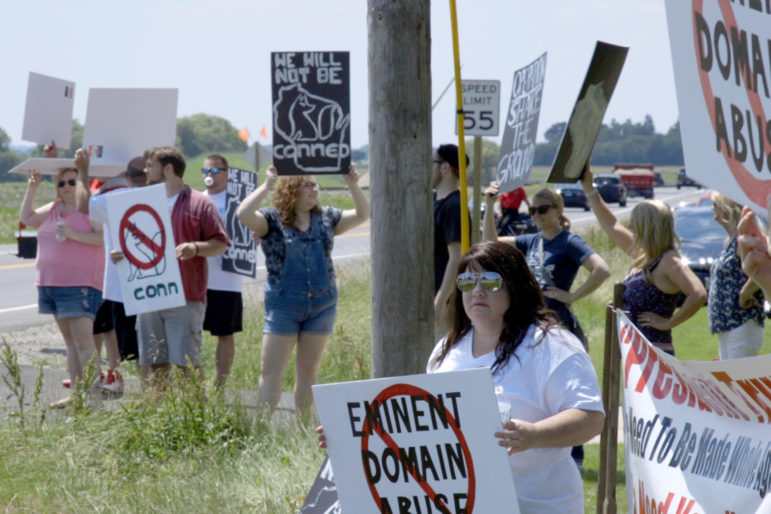
In late summer 2017, Cathy and Rodney Jensen started hearing rumors that their Mount Pleasant, Wisconsin, neighborhood could be changing.
Plans for a massive Foxconn flat-screen manufacturing plant had just been announced in July of that year. The Taiwanese company was planning a 20-million-square-foot complex and promised 13,000 jobs for the state.
The Jensens had owned a home on nearly 3 acres along Southeast Frontage Road for more than 20 years, close to the planned Foxconn development. Cathy Jensen said she went to a couple of village board meetings to get more information, but it was “useless.”
Then, like dozens of fellow homeowners, the Jensens received a relocation order from Mount Pleasant.
“They said that they needed .13 acres of our frontage for a road project … but they would be generous and offer us basically twice the amount and buy our whole property — our whole 3 acres,” Jensen said.

Wisconsin law gives municipalities the power to acquire private property using eminent domain as long as there is fair compensation and the property will be used for a public purpose. This is typically for road improvements, or sometimes to take control of dilapidated property.
As of late July, the village had paid just over $152 million for 132 properties to make way for Foxconn, plus $7.9 million in relocation costs, according to village records obtained by Wisconsin Public Radio and analyzed by Wisconsin Watch.
The records show the village threatened eminent domain against some homeowners, saying their property was needed for road improvements. But in some cases those plans changed or were dropped even before the homes — some of them newly built — were bulldozed, state records show.
Mount Pleasant Project Director Claude Lois said in written answers to questions that the acquisitions were at the direction of the Wisconsin Department of Transportation and were needed for public roads and utility improvements.
“While the (Foxconn) project has evolved, neither the purpose of those acquisitions, nor the need for the acquisitions, has changed during this process,” he said.
Lois added that the village has worked “diligently” to secure voluntary agreements with property owners of the approximately 130 parcels and has succeeded in doing so “in the vast majority of cases.”
“In all cases it has paid $50,000 per acre of land and 140 percent of appraised value for homes, plus the full package of relocation benefits,” Lois said.
Property bought — then they sued
The Jensens received a series of letters from the village seeking to buy their property. They ignored them, Cathy Jensen said, “so they assumed we agreed” to the sale.
Around April 2018, “We got a letter basically saying that they own our house now,” Cathy Jensen said. “We own your house and we’ll be very, you know, very generous and let you stay there rent-free until September 2019.”
The Jensens are still living there. According to village documents, $569,300 is sitting in a bank account for the Jensens, but they do not plan to touch it. Doing so, they say, means giving up.
Instead, they have filed two lawsuits, one in federal court and one in Racine County Circuit Court. The Jensens argue they were offered far less than other property owners.
They also argue the village has no right to take the property to benefit a private business — Foxconn — or to take more than the .133 acres cited in the relocation order, according to a motion that seeks to consolidate the two cases in federal court.
A Wisconsin Department of Transportation official said in an affidavit that the Jensen property was needed as part of a “protective purchase” of land to fulfill DOT’s plan to remove property owners’ access to the frontage road to improve traffic flow and safety.
Offers to owners differ widely
When land acquisition for Foxconn began, owners with “excess land” were offered options for $50,000 per acre, which the Jensens’ federal lawsuit claims is seven to 10 times the fair market value of the property. Homeowners, on the other hand, were offered 1.4 times the value of their properties.
The suit claims the road project was a “pretext” to make them sell land “which will not be directly utilized for the road and utility expansion project so that it can be conveyed to Foxconn, or held for Foxconn’s benefit.”
The Jensens were part of a federal lawsuit with several other property owners living in the Foxconn area. The Jensens are the only ones remaining in the suit. The case is in the U.S. District for the Eastern District of Wisconsin.
“Most of them could not continue their stance on fighting either because of monetary reasons … (or) it was too much mentally on some of them,” Cathy Jensen said. “(The village) told some people that if they didn’t sell voluntarily that they were going to use eminent domain, and eminent domain only guaranteed them fair market value for their property and they wouldn’t possibly receive the extra 40 percent that the town was very ‘graciously’ offering them.”
And that road reconstruction in front of the Jensens’ house, the one the village said was the reason for acquiring their property? It was finished last summer. The Jensens even got a new driveway out of the deal.

But, said Lois, “While WisDOT has not yet physically closed access to the Jensen parcel … it still plans to do so.”
Cathy Jensen believes the village’s real goal is to secure their land for Foxconn. “This property was supposed to be here forever — for our kids and our grandkids,” she said.
Owners of the nearby Land of Giants pumpkin patch fought — and won a temporary reprieve — against the village’s efforts to buy their land and buildings for the Highway 11 road project related to Foxconn. After the suit was filed last fall, Mount Pleasant withdrew its demand for sale of two parcels totaling more than 200 acres.
The village said it needed 3.3 acres for the road project and “temporary” easements on 5.3 acres that would have resulted in the loss of the home of Land of Giants’ owners David and Brenda Creuziger, a barn used for the pumpkin business and access to Highway 11.
So far, village records show Creuziger Farms has been paid $28,000 for right of way on the two parcels — a fraction of the cost of buying the entire parcels. Creuziger Farms made the same legal arguments as the Jensens, claiming the offer was “a thinly veiled attempt to circumvent the prohibition against taking private property for a non-public purpose.”
More purchases — and questions
Shawn and Sarah Mayer purchased 8 acres on Wheaton Lane in Mount Pleasant in 2012 with plans to build their dream home.
On May 15, 2017, the couple and their two young children moved into the custom built, 3,800-square-foot house. One month later, Shawn Mayer heard a report on the radio that Foxconn was coming.
Judging by the reports, Mayer realized they now lived right in the middle of the planned factory.
“When it was announced, I had just had 36 pallets of paving bricks delivered,” Shawn Mayer said.
So the Mayers waited, as owners of vacant land in the area sold their property to the village for up to 10 times its fair market value.
“We had stopped all landscaping,” Mayer said. “I never even leveled off the sand in the kids’ sandbox.”
Four months later, the Mayers received a certified letter from the village of Mount Pleasant. Their house, Mayer said, “was going to be purchased or taken with eminent domain.”
On a Friday night in November 2017, the village of Mount Pleasant called a special plan commission meeting to recommend rezoning more than 200 properties to “business park.” The following Monday, the Village Board approved the recommendation, which included the Mayers’ property.
Foxconn in flux
In November 2017, the village of Mount Pleasant and Racine County created a tax-increment district to pay for a $764 million investment to support the Foxconn project. The investment has since been increased to $911 million.
Local officials said the money would pay for land acquisition, infrastructure upgrades and other expenses. The costs are expected to be recouped over 30 years with funding and property tax revenue from Foxconn and other businesses in the district. “Current taxpayers,” according to the village and county, “are not bearing any new burden.”
The $911 million is on top of the $3 billion incentive package approved by the GOP-controlled state Legislature and signed into law by Gov. Scott Walker, a Republican.
Since setting its sights on Wisconsin in 2017, Foxconn’s plans have repeatedly changed. The company originally was going to build large flat screens with a so-called Generation 10.5 plant. Foxconn said market changes prompted the company to shift to a smaller Gen 6 facility.
In early 2019, Foxconn executives hedged briefly on whether they would be doing any manufacturing in the state at all. Now, they say the Gen 6 facility will begin operating in late 2020.
Foxconn fell short of its employment goal in 2018, hiring 178 full-time workers instead of the targeted 260. As a result, it failed to earn a tax credit of up to $9.5 million.
After visiting the site in June, Democratic Gov. Tony Evers said Foxconn will likely fall 300 jobs short of its target of 1,800 jobs in 2020.
Analyst: Project is a ‘snow job’
As Foxconn begins vertical construction on a nearly 1 million-square-foot factory at the site — a fraction of the previously planned 22 million-square-foot facility — a recent report has raised even more questions about how big the Foxconn project will be.
At the request of the state Department of Administration, an economist in August examined possible changes to the Foxconn incentive package given that the “currently-planned Foxconn facility is reported to involve a $2 billion investment, and 1,500 to 1,800 jobs.” That is significantly smaller than the planned $10 billion facility generating 13,000 jobs.
DOA Assistant Deputy Secretary Tia Torhorst declined to comment on the size of the project, referring that question to Foxconn. She issued a statement from DOA Secretary Joel Brennan that the report by the Upjohn Institute for Employment Research in Kalamazoo, Michigan, was an effort to “promote and protect Wisconsin’s economic development interests” through “expert advice and counsel to analyze the original and revised project.”
A spokeswoman for Foxconn, Myranda Tanck, released a statement from Foxconn Technology Group that criticized the assessment but did not offer a specific scope for the project.
“The Upjohn Institute Report, which is based on ‘current rumors’ related to jobs numbers, does not accurately reflect Foxconn’s commitment,” according to the statement.
Analyst Alberto Moel, who until recently covered the Asian flat panel display industry from Hong Kong for a research firm, Sanford C. Bernstein, said Foxconn has a pattern of delivering just a fraction of what it promises. He noted a proposed $1 billion manufacturing plant in Indonesia and a $30 million plant in Harrisburg, Pennsylvania, never materialized.
“But I don’t think they went as far as physically changing the landscape,” Moel said of the aborted projects. The Mount Pleasant project, he said, “obviously went to a further extent.”
David Black, head of Harrisburg’s regional economic development agency, said Foxconn worked directly with then-Gov. Tom Corbett on a proposal for a manufacturing facility. His agency had nothing to do with the project. No site was chosen and no incentives were given.
“There was an announcement, it was kind of low key, and the governor was a participant with the Foxconn folks,” Black said. “And that was the last we ever heard of it.”
Moel, who wrote a 149-page research paper on Foxconn for investors in 2012, describes the company as secretive and a “black box.” He believes the Wisconsin project is a “snow job.”
Homeowner accuses village of deceit
At this stage, the state, the village of Mount Pleasant and taxpayers all have a financial interest in seeing Foxconn come to fruition. But for one particular group — homeowners — the future of “Wisconn Valley” is more personal.
Michael and Joy Mueller used to live at 9725 Braun Road. The couple built their home and farm on 5 acres about 25 years ago.
The property included a swimming pond surrounded by 43 evergreens.
“My dogs loved it there,” Joy Mueller said. “And my friends loved it. They said it was like going up north, but you weren’t.”
The Muellers first heard about Foxconn from neighbors, who had already been approached by the village to sell because they had more property.
Homeowners were all invited to a village meeting Oct. 11, 2017, where Joy Mueller said they were told their property would likely be taken by eminent domain.
“It was very vague, and anyone who knew anything was out of town,” Mueller said.
A month later, at another village meeting, Mueller and other homeowners were provided with a nine-page packet titled “Racine County Welcomes Foxconn To The Village of Mount Pleasant.” On the second page, was a color map showing Braun Road in front of the Muellers’ home being expanded from two to four lanes.
Mueller said seeing that map made it clear to her that the village would be able to take her home.
“There was going to be four lanes there — that that was the reason they were taking us under eminent domain,” she said.
After hearing that, the Muellers began looking for another parcel of land to purchase. They requested early acquisition from the village of Mount Pleasant in January 2018.
“You don’t sleep, you don’t eat, you think about this 24/7 — I have to work for a living — I was just done,” Mueller said. “The end result was fair — because of price — but as far as dealing with them, I thought they (Mount Pleasant officials) were very vague and lied all the time.”
The village bought the Muellers’ property for $991,000 plus $233,000 in relocation assistance. Their property was assessed at $333,500 in 2018, according to Racine County tax records.
Records obtained by WPR and a statement from Lois raise questions about why the Muellers’ house was purchased by the village.
According to state DOT emails under the subject line of “Updates from 12.8.17 Meeting with Mt Pleasant,” the idea of widening Braun Road from two lanes to four in front of their house had been scuttled by December 2017.
But three months after that email exchange, the Muellers received their relocation order from the village, saying their property was needed for the improvement or expansion of Braun Road.

Lois said the map showing Braun Road’s expansion was used during a November 2017 presentation to look at “potential lane usage” in the area, prior to any traffic studies being done.
Now, DOT plans in that stretch show Braun Road will be reconstructed beginning in 2020 — but the road itself is not targeted for expansion. Lois argued that whether the road is expanded is “not relevant” since the Muellers “approached the village regarding sale of the entire parcel and did not seek to sell only a portion of the parcel.”
But Joy Mueller said she understood Braun Road was being expanded and that the property could be taken by eminent domain. Selling only a sliver of property, she said, was never presented as an option.
In March 2018, the Muellers received a relocation order from the village. They moved in March 2019. Their house was razed June 2.
“I should have never signed, but like I said, I was tired, and I was done,” Mueller said. “I wouldn’t wish this upon anybody. They (village officials) bring the word ‘snake’ to a new level for me.”
Kim Mahoney and her family are among the few residents remaining at the Foxconn site. Their new house is the only one left in a subdivision that used to have 13 houses. She believes the village altered road plans to apply pressure to her and her neighbors.
“The village made millionaires out of the vacant land owners but threatened all homeowners with eminent domain, sometimes based on fake road plans, in order to force them to sell on its terms,” Mahoney said. “We have been willing to sell since day one, but we were unwilling to allow them to abuse their eminent domain authority for the benefit of a wealthy foreign corporation.”
Change of plans
The Mayers hired an attorney, but in the end, sold their property. Public records show the village paid the Mayers $1.5 million for their house, land and relocation costs.
“If we wouldn’t have had land, we would have gotten screwed,” Mayer said. “We made up with it with the $50,000 an acre.”
Mayer said his business, Mayer Repair, specializes in municipal vehicles. He did not want to leave his home but said he did not have a choice.
“I didn’t want to create waves,” Mayer said, adding that he could have lost accounts if he refused to sign. “I’m a small business, and I have to worry about other people getting paychecks every week.”
Questions remain about the future of Wheaton Lane, where the Mayer family lived. On Dec. 15, 2017, a project engineer from HNTB Corp. in Kansas City emailed the DOT asking if plans to use the road were still happening.
According to the emails obtained by WPR, a DOT official said he was not sure. Jim Machnik, relocation agent for Mount Pleasant, told the engineer that the village would be removing Wheaton Lane to construct a “major connector at the location.” Doing so required all of the homes to be acquired, he said.
Lois said current plans still show a “major connector” in the area, but he acknowledged those plans could change.
“Any changes or improvements to Wheaton Lane will be considered in the future as those developments are solidified,” he said.
Meanwhile, Mount Pleasant is leasing two parcels on Wheaton Lane for $1,000 a month to a local cable company to store materials.
“If you look at the people who live on Wheaton Lane — where they told them they needed their properties because there was going to be a road going through — and they got all the properties, and the road disappeared. Now there’s no road,” said Kelly Gallaher, one of the creators of the Facebook page, A Better Mt. Pleasant, who attends nearly every Village Board meeting.
“They (village officials) will say plans change, but after a while, you see a pattern, where they are using these changing plans in order to acquire properties, with the Jensens’ being the most egregious,” she said. “They simply want the land for Foxconn.”
Resident feels ‘railroaded’
Moel believes it will likely be 10 to 20 years before many of the plans come to fruition — all because local officials fell for the promises of Terry Gou, who was then Foxconn chairman.
“Mount Pleasant believed them, and they prepared for that as if it was going to happen, when it was never going to happen, because that is not how they (Foxconn) do business,” Moel said. “That is a failure of Mount Pleasant not doing their due diligence and just doing some cursory research and not realizing this is how this guy (Gou) operates.”
All of the homes on Wheaton Lane are gone. Shawn Mayer says he has moved on and now lives west of Interstate 94, away from the project site.
“I’ll always be a little bit bitter, just because we elect the officials that railroaded us on this,” Mayer said. “I did my homework when they said Foxconn is coming. … Two places they said they were going to build, and they didn’t.”
Wisconsin Watch Managing Editor Dee J. Hall contributed to this report, which was produced by Wisconsin Public Radio and the nonprofit Wisconsin Watch, (www.WisconsinWatch.org), which collaborates with WPR, Wisconsin Public Television, other news media and the University of Wisconsin-Madison School of Journalism and Mass Communication. All works created, published, posted or disseminated by Wisconsin Watch do not necessarily reflect the views or opinions of UW-Madison or any of its affiliates.

































